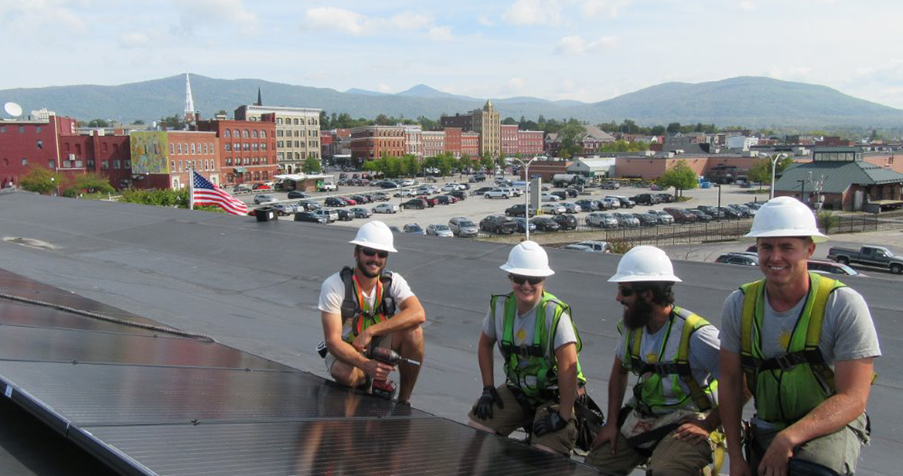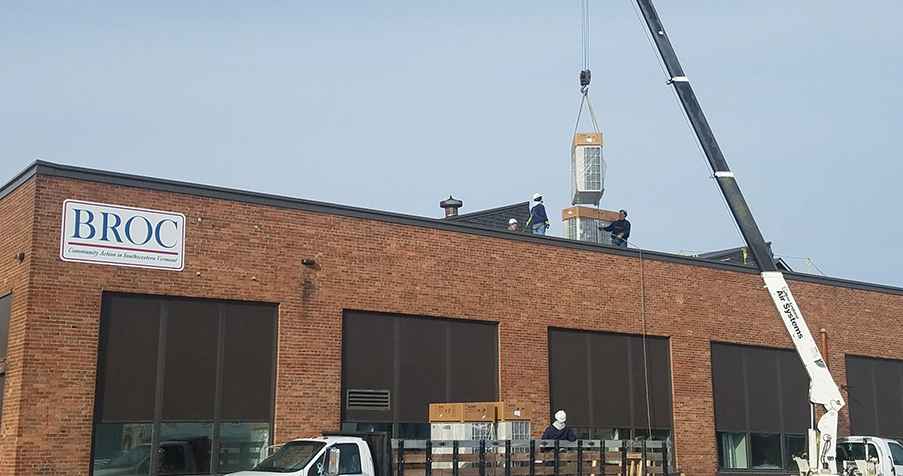Commons Energy’s Unique Model Provides Energy Savings to Underserved Communities
Oct 26 2018
When low-income residents in western Vermont need help with food, shelter, emergency fuel, weatherizing their homes, or other life necessities, they often turn to BROC Community Action.
But a few years ago, the nonprofit organization itself needed weatherizing help. It had purchased a 50,000-square-foot building in Rutland, Vermont, that had been neglected for years. Its lighting, heating, ventilation, and air conditioning systems needed to be replaced. When BROC couldn’t find a lender to finance the upgrades, Commons Energy was able to help with both the retrofits and the financing to pay for them.
The organization is a Vermont-based low-profit limited liability company (L3C) that helps owners of public-purpose buildings—affordable housing, schools, healthcare facilities, community centers, and the like—reduce their energy and water use.
After performing an analysis of BROC’s building, Commons Energy offered a $1.2 million loan and undertook the retrofits, which included expanding the building’s insulation cavity to boost its performance. As a result, BROC now expects to use 60 percent less energy and cut its utility bills by $50,000 a year. That means it will have more money to spend on helping Vermont residents.
Business model delivers many benefits
The project is an example of Commons Energy’s innovative model—a model that has the potential to increase access to energy efficiency in underserved communities nationwide.
“Commons Energy’s approach offers several benefits,” says Stu Fram, RSF’s senior associate, social enterprise lending. “There’s the environmental impact of buildings using less energy, there’s the economic benefit of reduced utility bills, and there’s the resulting society benefits—more people get reliable warmth during frigid winter months. There isn’t much precedent for what their work accomplishes across multiple dimensions.”
In about four years of operation, Commons Energy has completed 11 projects that have saved their owners $280,775 annually and provided total greenhouse gas emissions reductions of 780 metric tons.

Solar panel installation in downtown Burlington, VT. Photo courtesy of BROC Community Action.
Serving today’s needs with an old concept
Commons Energy was created in 2014 by the Vermont Energy Investment Corporation (VEIC), a nonprofit devoted to energy efficiency and renewable energy technology.
VEIC had explored the idea for Commons Energy in the 1980s before shifting focus to concentrate on political and regulatory support for energy efficiency instead.
“Commons Energy goes back to the VEIC founding days,” says Brian Pine, a relationship manager at Commons Energy. But VEIC never forgot about the concept, and when energy prices soared in 2012 and 2013, they saw the time was right. In 2014, the nonprofit launched Commons Energy as a public-purpose energy service company (PPESCO) that offers services in the communities where VEIC works: Vermont, Ohio, and Washington, DC.
New model delivers energy savings to nonprofits in need
Commons Energy is unique for several reasons. First, the company focuses on smaller buildings whose owners struggle to find funding for energy retrofits. It offers a turnkey solution, financing projects and handling everything from energy analysis to overseeing contractors to monitoring energy efficiency during the term of the loan.
The financing model is particularly unusual. Consider the example of a nonprofit that pays $1,000 a month in energy and water bills. By contracting with Commons Energy for a retrofit, it might end up paying only $700 a month for utilities, for a savings of $300 a month. Of that, $200 might go toward repaying the loan from Commons Energy (often a 10- or 15-year term), and the remaining $100 would be the nonprofit’s to use.
And Commons Energy guarantees expected energy savings, giving the nonprofit a buffer against rising energy usage. If the energy usage savings don’t meet expectations, Commons Energy makes up the difference.

Photo courtesy of BROC Community Action.
Success breeds need for less restrictive financing
When Commons Energy launched, it received funding—both loans and grants—from a number of sources, including the MacArthur Foundation, the Kresge Foundation, and the Vermont Community Foundation. But some funders required that the money be used on affordable family housing projects only. Others would fund projects only in Vermont.
Commons Energy needed less restrictive funding so it could help owners whose buildings weren’t affordable housing or based in Vermont. In 2015, it turned to RSF for help.
“When we met with the folks at RSF, we quickly felt there was a lot of shared enthusiasm for the goals of our work,” says Peter Adamczyk, Commons Energy’s capital operations manager.
It took some time to land on a financing structure that worked for both RSF and Commons Energy, in part because of the PPESCO’s unique business model. “They were doing something that hadn’t been done before,” says RSF’s Fram. “They were trying to meet needs that other energy service companies had always ignored or overlooked. As a result there were no case studies anyone could point to.” Because Commons Energy—and VEIC—operate on a shoestring budget, it also could offer no collateral to secure a loan.
“We had a very productive session with RSF’s team and found them willing to work through the issues,” says Adamczyk. “Those talks demonstrated RSF’s willingness to understand the complexities of our business and the measures we take to reduce risks for ourselves, our clients, and our capital providers.”
“Those talks demonstrated RSF’s willingness to understand the complexities of our business and the measures we take to reduce risks for ourselves, our clients, and our capital providers.”—Peter Adamczyk, Commons Energy
RSF took a creative approach to make the deal work, asking several of Commons Energy’s philanthropic funders to secure the loan. The MacArthur Foundation, the Kresge Foundation, the High Meadows Fund, the Vermont Community Foundation, and the Merck Family Fund have made pledges that serve as collateral.
In March 2017, RSF offered Commons Energy a $500,000 line of credit, which Commons Energy uses to extend financing to its clients.
Perfecting a model for others to follow
Commons Energy is now free to underwrite a broader array of projects, which the company expects will reduce greenhouse gas emissions by 163 metric tons per year. Already, $300,000 of the loan has gone to the BROC Community Action retrofits, which are almost completed.
Commons Energy’s goal is to perfect its model so others can emulate it. “We’re not quite at the point where we have it all figured out and are ready to launch this in other markets,” says Common Energy’s Pine. “But our idea is to create a great model, put it out there in the public domain, and hopefully have others jump on board.”